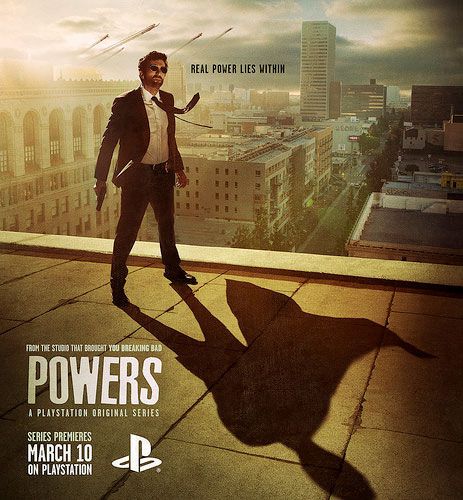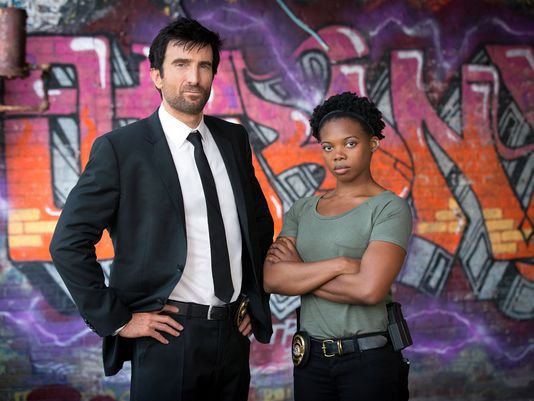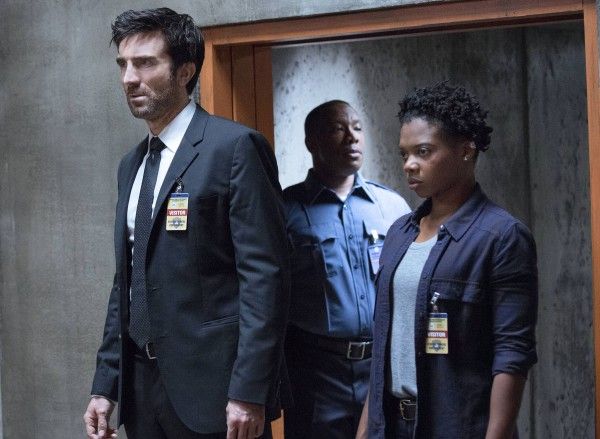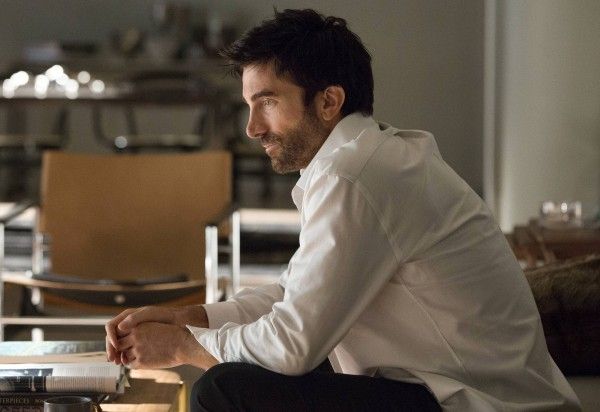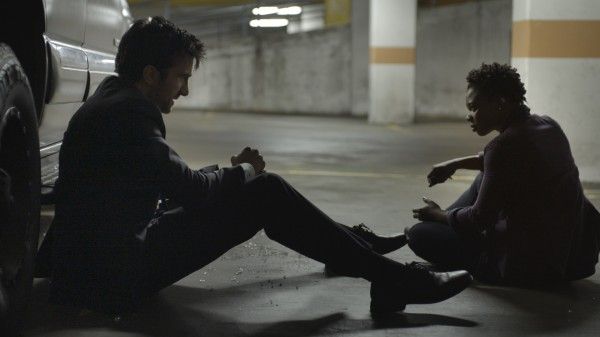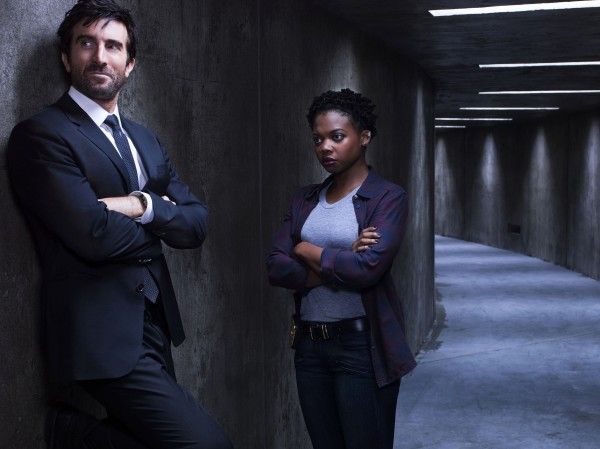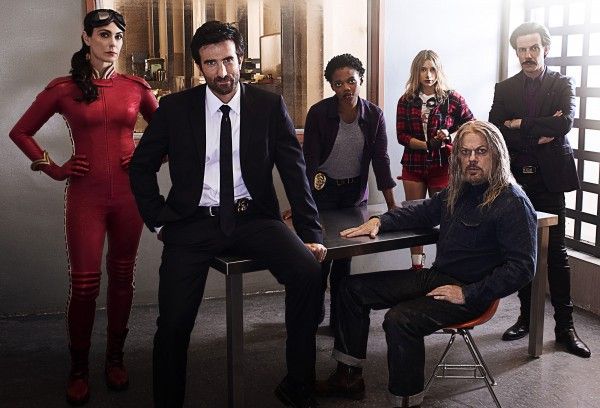Inspired by the graphic novel series of the same name, Powers follows the lives of two homicide detectives, Christian Walker (Sharlto Copley) and Deena Pilgrim (Susan Heyward), who are assigned to investigate crimes involving people with extraordinary abilities, called “Powers.” It is a world full of superheroes who aren’t actually heroic and who use their powers as an excuse for mischief, mayhem, murder and endorsement deals, while today’s paparazzi culture eats up every second of it. The show will launch three episodes on the PlayStation Store on March 10th, with subsequent episodes available weekly, with the first episode free to everyone while the entire season is free to PlayStation Plus subscribers.
During this interview with press to promote the series, actor Sharlto Copley (who plays a former Powers superstar whose powers were stolen in a violent battle with his former mentor turned mass killer) talked about the differences from the source material, his character’s backstory, exploring this new territory for TV, the partnership between Walker and Pilgrim, Walker’s relationship with Wolfe (Eddie Izzard), his past with Retro Girl (Michelle Forbes), why people are so obsessed with Powers, and how the production design adds to the look and feel of the show.
Question: In the comics, Christian Walker starts off as someone who’s closeted about his powers, whereas in the TV show, he’s formerly famous and everybody knows who he is. When you look at the show versus the source material, how would you say the character is improved by giving him this backstory?
SHARLTO COPLEY: Coming into this, I was not familiar with the Powers comics. The showrunner, Charlie [Huston], said to me, “Look, I really don’t want you to go too much into the comic books. Brian [Bendis] and I have a version of this world that we would like to create for television that is a bit different from the comics. And so, I never got into what the major differences were. Certainly, I’m aware now of the difference that you mentioned. One of the biggest draws to me, with the TV show, was this idea that there would be a social commentary aspect, to a degree. There’s this thematic idea of people’s obsession with fame and power. And so, in this Powers world of the show, there are many different levels of powers. One guy might be able to levitate three feet off the ground, and that’s all that he can do. And then, you have Retro Girl, who’s more like Superwoman, with a wide range of powers. These are the people that young teenagers aspire to be like. Instead of Britney Spears with an endorsement for a soft drink, you’ve got Retro Girl.
So, Christian Walker, back in the day, was one of the very famous Powers. He had almost Superman-like powers. He could fly. And what is important in that world, and one of the things that grounds the series in reality, is that just because you can fly, it doesn’t mean you’re going to go and help people. How are you going to make money doing that? And if there are other guys that can fly, how do you get noticed? You could draw an analogy with rock stars or actors. There are lots of people doing it, so who are the ones getting known and why did they get known? Christian was very good at getting attention. He was very charming. He was good at playing the media, in addition to being somebody who was a hero and helped people. He had his groupies. He did drugs. He drank. He would go off the rails, at times, but still be a superhero. So, as you come into the show, you have a man who’s really haunted by the fact that he was once this very famous, powerful guy who could do whatever he wanted. He was loved by many people in the public.
Did you have any significant conversations with (comic book creator) Brian Michael Bendis about the character, especially how you were going to play him for television, and did he give you any particular insights that helped you create your Christian Walker?
COPLEY: Not specifically. Most of my conversations happened with Charlie Huston, who was working closely with Brian. The vast majority of the conversations I had, in terms of developing this version of Walker, were with Charlie, but very much with Brian’s sanction and awareness and approval, in terms of the way it was going.
You’ve primarily worked in movies, in the past, and now you’re part of a TV show for a gaming console. What is the difference in the experience, exploring this new territory?
COPLEY: Well, two things were very attractive to me. One was the project, and one was that it was going to be for a new platform. I’m always interested in trying to be involved in anything interesting and new that pushes boundaries, and it’s on a TV series where you would get to spend time with that character and develop him. What was interesting to me is that the way we started to realize Walker is very layered and very complex. Ultimately, hopefully that will lead to a more entertaining character that can go in a lot of different directions. He desperately wants to fly again, like he could, back in the day. He’s haunted by memories of his past, and mistakes he made in his past. And just as a character, you have someone where, just looking at him at the start of the show, it might be difficult to believe why this guy was very charismatic. He was very good with the media, and he was good with people. It’s really fun, playing a character that is so multi-faceted. There’s a part of him, because he became famous and powerful at a young age, that’s almost back as a kid. You don’t see too much of that in the early episodes, but it’s there in certain environments. He’s like the spoiled kid that doesn’t get his way. A certain level of emotional immaturity in relationships starts to come out, and that’s very exciting. It’s fun to play a character that can go to these different places, over a whole series or a couple of seasons.
Because Walker and Pilgrim obviously come from very different worlds, how will that work to their advantage, in their partnership on cases, and how often will that cause problems and tension for them?
COPLEY: The relationship between Christian and Deena is very, very critical to I think what makes the show interesting to watch. That was one of the things I was very relieved about, watching the first table read that I had with Susan Heyward, who plays Deena. We just had a connection, straightaway. We had a real heart connection and got on really well. As actors, we just had a lot of fun, antagonizing each other, from time to time. Christian knows about Powers. He was in that world for a long time. He knows about superheroes. He has a lot of experience in fighting them and dealing with them, in reading situations involving them and understanding how they think, and in understanding the limitations of certain people’s powers. He’s one of the best people at having that information. He’s also used to doing whatever the fuck he likes, frankly, and being alone and not really having to listen to people, and certainly not filling out paperwork. And then, there’s Deena, who tries to be this by-the-book cop who’s very focused on detail and very focused on following the rules. She doesn’t have the same level of ego that Christian has, being a former rock star. And so, that creates a very interesting situation where they both have skills that are practically useful in solving crimes. She’s looking at details and making calculations about what might have happened, and he’s looking at how Powers behave. That’s all very useful to police work. But then, the two personalities clash quite considerably, in the sense that Christian is way more self-centered. Deena thinks we should be working as a team, and Christian is not so much of a team player.
Obviously, the relationship between Walker and Pilgrim is central to the series. How has it been to build the rapport that you have with Susan Heyward?
COPLEY: Fortunately, we got on very well, very quickly. We both wanted to apply ourselves, as best as we could, to this, so we spent quite a bit of time, outside of the regular shooting hours, or in down time when they were shooting with someone else, or in the time between set-ups, just constantly talking about the characters and their backgrounds. She’s a real thespian, coming from the theater world. We both took this very, very seriously. I probably got the most method I’ve ever gotten with a character. I would stay in character, pretty much the whole day, for the first two months that I was on the set. But I would sit and spend time with Susan, and we would play around. We were constantly communicating. I’d never worked on TV before. You’re changing directors, constantly. Sometimes the showrunner is there, but sometimes he’s not. Eventually, you’re left with making sure you’re doing the best you can with the material and the scripts you’ve been given. So, we would constantly talk to each other in scenes, explore ways into a scene, and try different tones within a scene. Very fortunately, we had a showrunner who was prepared to let us go with the script a little bit, from time to time. We would throw in our little ideas, from time to time. We had a real understanding, quite quickly, of the major things between our two characters that would create sources of tension, but also what then underlies that. Why do these two characters need each other? Why would they be helpful to each other, as the season progresses, or even went into other seasons?
In the pilot, Christian seems a little bitter towards other Powers because he obviously misses his own. How does that affect his job?
COPLEY: He’s definitely a little bit resentful and going through a whole bunch of different emotions. Now that he no longer has powers anymore, he can be more judgmental of the behavior of some of those Powers, while forgetting that he himself wasn’t exactly the most exemplary role model, back in the day, when he was super powerful. Everyone was looking up to him. There is a little bit of hypocrisy that comes in there, as well. He’s like, “Who do these people think they are? Just because they have powers, they think they can do anything they like.” But he, himself, wants to be in that position. It’s just one of the many things that makes the man incredibly conflicted. There’s a lot of internal stuff going on that is constantly getting manifested externally, in some other way, in terms of his behavior.
What can you say about Christian Walker’s relationship with Wolfe (Eddie Izzard), in the past and present?
COPLEY: As is the case with so many of the characters, in the way that Charlie writes, there are so many nuanced and layered elements to the characters and their relationships with the other characters in the series. One of the more useful analogies for Christian and Wolfe might be a father and son relationship that’s gone horribly wrong. There are incredibly mixed emotions with Christian whenever he’s dealing with Wolfe. I had a great time doing scenes with Eddie. I think the two of us had an enormous intensity and chemistry on screen that I really enjoyed. I really enjoyed playing the scenes with him, and then watching the stuff back afterwards. Wolfe was in Christian’s life, as he discovered that he had these powers, and was an inspirational role model figure in the early days, until things started to go a little wrong.
Were Christian and Retro Girl a power couple, back in the day, and will we see them rekindling any romance?
COPLEY: That’s a very good guess, and you may well. I think I need to stop talking, at that point. Let’s leave it at that.
It’s common, in superhero fiction, to deal with the loss of humanity that comes with having powers and the disconnection from regular people. But in the world of Powers, it seems like regular people have that as much as the Powers do since almost everybody is obsessed with powers. Is that something you guys had fun exploring?
COPLEY: The idea is that there are a lot of people that have marginal powers, like a guy who levitates a little bit off the ground, or someone who can breathe a little bit of fire, or someone that can freeze a little bit of something, if it’s really close to him, you say, “Well, what do you do with that? How is that useful?” Because there is so much of it around you and you’re seeing it, it becomes the important thing in society. It’s like rock stars. There are musicians all over the place. There are millions of bands everywhere. But that doesn’t mean that people aren’t obsessed with their favorite rock star, or their favorite rapper. The obsession with Powers, to a certain degree, is the obsession with actual power in one’s own life. Metaphorically, that was very much how I saw it, and I think that’s what the series has something to say about. You’re special, if you have some power in the world. People are looking at you and they think you’re special. This show, for me, is very much a metaphor of that. It’s very much going, “Look how obsessed people are with power, with being noticed and with being special.”
What does the very unique production design add to the look and feel of the show?
COPLEY: I think that’s important. When you do this type of genre stuff, you’ve got to have an interesting, strong look. You’ve got to have stuff that looks cool. This genre is very visual, and very much about the design of the superhero costume and the vehicles. All of those choices are very important. There’s the main underground prison that was actually built on a massive stage in Atlanta. We had this huge series of connecting tunnels and rooms that we shot in, and an enormous amount of detail went into the production design. I think it’s a unique combination of elements. Walker has got this retro pad. It’s a bachelor pad that he had in the city, from when he was in his rock star days and would take his groupies there. He’s stuck there. He hasn’t changed much since ten years ago. So, there is a lot of attention to detail in the production design, and it gives you something fun to look at.
Powers debuts in the PlayStation Store on March 10th.


